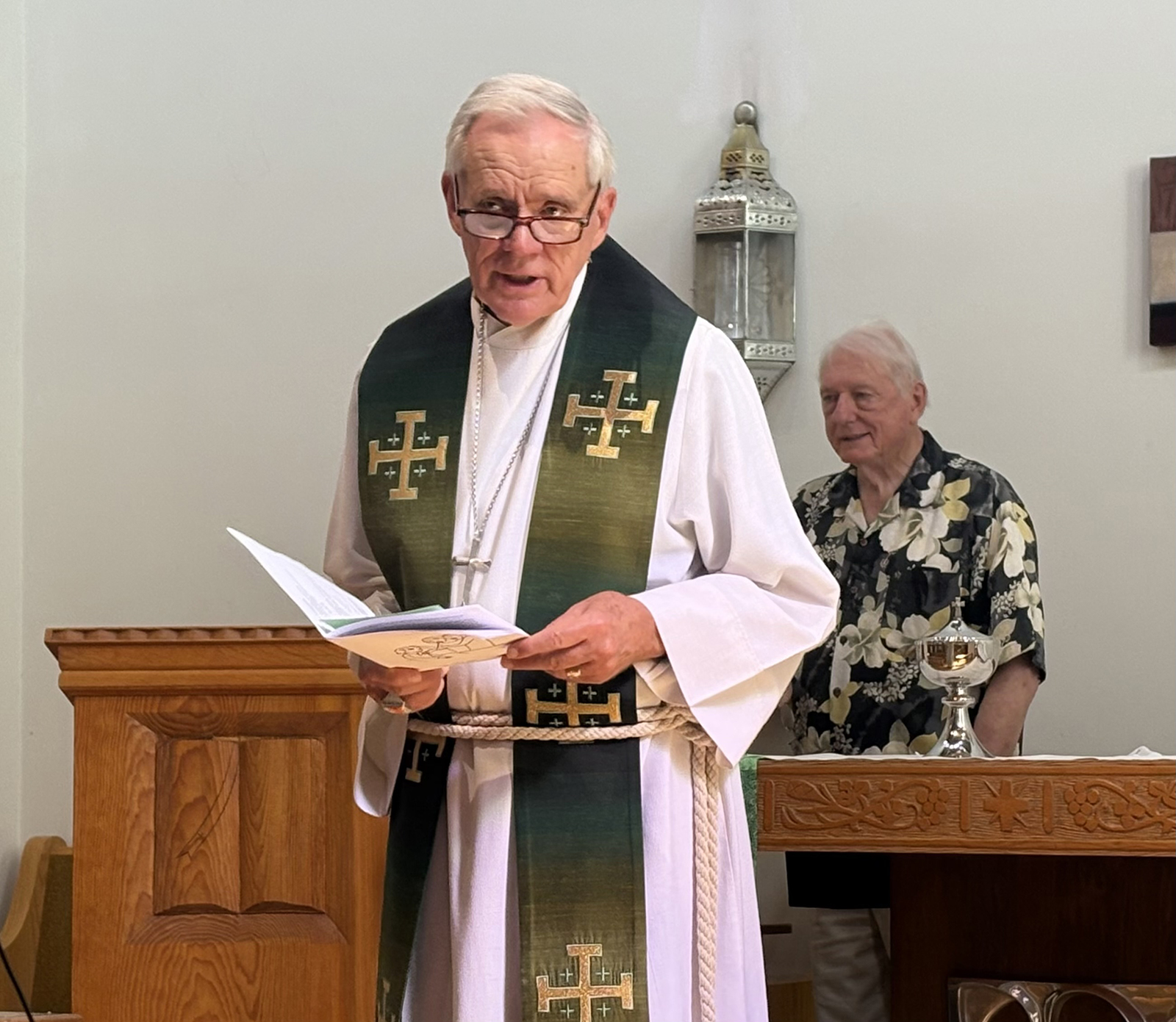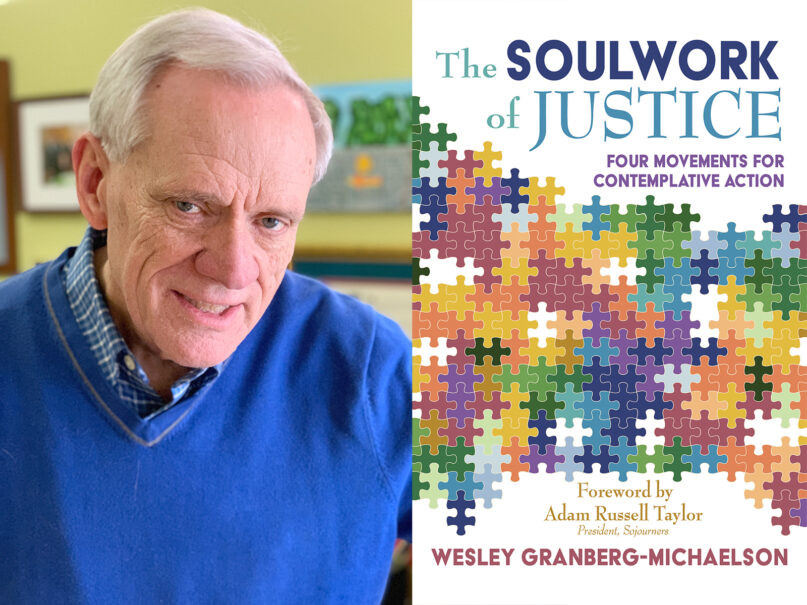
WASHINGTON (RNS) — The Rev. Wes Granberg-Michaelson has spent decades following a spiritual practice that at first seemed foreign to him, having been raised as a conservative evangelical.
Once an aide to former Republican Sen. Mark Hatfield and later an executive at the World Council of Churches, Granberg-Michaelson was inspired by an ecumenical church in the nation’s capital to start journaling. Church of the Saviour emphasized ways “to integrate our inward spiritual journey with our outward call to action and mission,” he said. Regularly collecting his thoughts with pen and paper became a quiet form of self-examination.
Now, he has written a guidebook on how faith leaders can undergird their public activism with private spirituality. “The Soulwork of Justice: Four Movements for Contemplative Action” was released by Orbis Books on Wednesday (Sept. 24).
“It’s a way to process your pain and your grace and to get some distance from it and to reflect on it,” he said of journaling during a book talk Monday at a private reception hosted by the Catholic Mobilizing Network on Capitol Hill.
Granberg-Michaelson, 80, is former general secretary of the Reformed Church in America. Today, he is a member of the advisory council of the Catholic Mobilizing Network, which seeks to abolish the death penalty, and serves on the boards of Sojourners, a social justice advocacy organization, and the Global Christian Forum, an ecumenical initiative that includes Catholic, Orthodox, evangelical, Pentecostal and mainline Protestant church leaders. He currently co-leads an Evangelical Lutheran Church in America congregation in Santa Fe, New Mexico, where he and his wife are both serving one-year contracts as pastors.
During the height of the COVID-19 pandemic, Granberg-Michaelson’s wife, the Rev. Kaarin Granberg-Michaelson, also an ordained RCA minister, suggested he read through his writings in the journals that filled their home’s bookshelves. Originally, he thought that year of reading would lead to pearls of wisdom to share with their two children. But his agent for a previous book convinced him his personal lessons should reach a wider audience, he said.
RELATED: Granberg-Michaelson to retire from RCA
“My life has been an outward life,” he said of his ecumenical, political and denominational work. “But what really matters when I reflect back are my struggling attempts to figure out how do I go inward and find the basis of grounding and really settling in that embrace of God’s love that captures you. And that then connects you completely to all the world’s pain and suffering.”
The book, which includes excerpts from his journals, encourages readers toward four shifts: moving beyond self-sufficiency to finding a sense of belonging; transitioning from a focus on certainty to greater connections; moving from grandiosity to authenticity; and going from control to trust.
“Unswerving, indefatigable commitment to a cause, with prophetic urgency, is the catalyst for social change,” he writes.
He then adds a warning for leaders not to follow examples that have caused some church leaders to be enveloped in scandals: “But if you allow such a cause to smother attention to inner motives, vulnerabilities, and ego needs, you will pay a personal price.”
John Carr, retiring founder of the Initiative on Catholic Social Thought and Public Life at Georgetown University, said the lessons of his colleague’s book reveal the kind of leadership Granberg-Michaelson has modeled for others.
“Wes is one of the most faithful, persistent, consistent religious leaders of our time,” Carr said in an interview with RNS, “and to have his reflections on how to hold together the spirit in the world is invaluable in tough times.”

“The Soulwork of Justice: Four Movements for Contemplative Action” and the Rev. Wes Granberg-Michaelson. (Courtesy images)
Granberg-Michaelson suggested using journaling, retreat centers in the mountains or desert, and tools such as the Enneagram or Myers-Briggs personality tests for internal discovery, as well as worship and prayer.
As he reflected on his journals, he recalled a busy life in D.C., saying, “Washington was doing me in.” He ended up retreating to Missoula, Montana, developed his interest in the environment, started a nonprofit for environmental stewardship and ended up at the World Council of Churches leading its work on ecological issues.
“I’d never expected that, and it just happened because of the shifts that I made that were driven by my internal life,” he said, when asked what surprised him most about rereading his journals. “When I read back through it all, I saw just how consequential that was.”
He also recommends a specific focus on resilience in work and spiritual life.
“I don’t know how many strategic plans I’ve led, and I tell people I’m never going to do another one because events simply wipe them out,” he said. “COVID wiped it out. George Floyd’s murder wiped it out. Climate change wipes them out. What we need is resilience, and I think in our spiritual life, it’s the same way.”
In his talk, Granberg-Michaelson, who has opposed policies of President Donald Trump, noted he completed the book before Trump won the presidential election for a second time in 2024. The author said that as a result of Trump administration policies, some social justice advocates “are in organizations that feel like 25 years of work has just gone down the drain.” He hopes those activists can find ways to carry on with a greater sense of grounding.
“We’ve got to figure out how we’re going to be in this for the long term,” he said. “I mean, it’s not just the midterms, not just another election. It’s how are we really rooted in a different vision of what God intends for this world, that’s not just in our heads, but that’s rooted in our souls?”
He pointed to examples of the Eucharist at Catholic Mass or the Communion service he oversees at his ELCA congregation.
“When you do that act, you’re saying you cannot separate what is within with what is without,” he said. “It’s brought together. And I think that that’s what we need to nurture in our lives going forward.”
His advice has been welcomed by others who have worked on faith-based advocacy in the nation’s capital. The Rev. Adam Russell Taylor, president of Sojourners, wrote in the book’s foreword about how he took the author’s advice to do a silent retreat, during which he determined it was time for him to make a career change.
“In these days of growing polarization, many of us struggle to find community and belonging, surrounded as we are with social media pressures, increasing acrimony, and the burgeoning use of AI,” Taylor wrote. “These perilous times call for the kind of courage and resilience that is so often found in and renewed by the inward journey. And increasingly that journey must be connected to the outward witness and activism that will be so desperately needed in the months and years ahead.”
RELATED: How to make a pilgrimage into 2021
